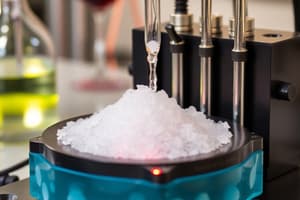Podcast
Questions and Answers
What is the main purpose of electrolysis?
What is the main purpose of electrolysis?
- To drive a non-spontaneous chemical reaction (correct)
- To facilitate a spontaneous chemical reaction
- To mix gases for industrial purposes
- To purify metals through heating
At which electrode does oxidation occur during electrolysis?
At which electrode does oxidation occur during electrolysis?
- Electrolyte
- Anode (correct)
- Cathode
- Electrode conductor
Which component of an electrolytic cell is responsible for conducting electricity?
Which component of an electrolytic cell is responsible for conducting electricity?
- Electrode
- Anode
- Electrolyte (correct)
- Cathode
What is commonly produced during the electrolysis of water?
What is commonly produced during the electrolysis of water?
In the electrolysis of sodium chloride, what is produced at the cathode?
In the electrolysis of sodium chloride, what is produced at the cathode?
What does electroplating achieve?
What does electroplating achieve?
During electrolysis, what happens to anions at the anode?
During electrolysis, what happens to anions at the anode?
Which of the following is an application of electrolysis?
Which of the following is an application of electrolysis?
How do cations behave during an electrolysis reaction?
How do cations behave during an electrolysis reaction?
What happens to the silver anode during electroplating?
What happens to the silver anode during electroplating?
Flashcards are hidden until you start studying
Study Notes
Electrolysis
- A process using electric current to drive a non-spontaneous chemical reaction
- Electrolytic cell is the setup for electrolysis, containing:
Electrodes
- Conductors immersed in the electrolyte
- Anode: Positively charged, oxidation (loss of electrons) occurs here
- Cathode: Negatively charged, reduction (gain of electrons) occurs here
Electrolyte
- Liquid or solution containing ions that conduct electricity
- How electrolysis works:
- Direct current (DC) power source connected to electrodes creates an electric field
- Positive ions (cations) move towards the cathode, negative ions (anions) move towards the anode
- Redox reactions occur:
- Anions lose electrons (oxidation) at the anode
- Cations gain electrons (reduction) at the cathode
Examples of Electrolysis
Electrolysis of Water
- Decomposes water into hydrogen and oxygen gas
- Chemical equation: 2H₂O(l) → 2H₂(g) + O₂(g)
- Cathode: 2H₂O(l) + 2e⁻ → H₂(g) + 2OH⁻(aq)
- Anode: 4OH⁻(aq) → O₂(g) + 2H₂O(l) + 4e⁻
Electrolysis of Molten Sodium Chloride
- Produces sodium metal and chlorine gas
- Chemical equation: 2NaCl(l) → 2Na(l) + Cl₂(g)
- Cathode: Na⁺(l) + e⁻ → Na(l)
- Anode: 2Cl⁻(l) → Cl₂(g) + 2e⁻
Electroplating
- Thin layer of one metal deposited onto another
- Used for decorative purposes or corrosion prevention
- Example: Silver plating a steel spoon
- Cathode: Ag⁺(aq) + e⁻ → Ag(s) – silver ions from solution are reduced and deposited
- Anode: Ag(s) → Ag⁺(aq) + e⁻ – silver anode dissolves to replenish silver ions in the solution
- Example: Silver plating a steel spoon
Applications of Electrolysis
- Production of metals, e.g., reactive metals like aluminum and sodium from their ores
- Production of non-metals, e.g., chlorine and fluorine
- Electroplating: coating objects with a thin layer of metal
- Electrorefining: purifying metals like copper
- Production of chemicals, e.g., sodium hydroxide
- Battery recharging: reversing the chemical reactions in a rechargeable battery to restore its charge
Studying That Suits You
Use AI to generate personalized quizzes and flashcards to suit your learning preferences.




